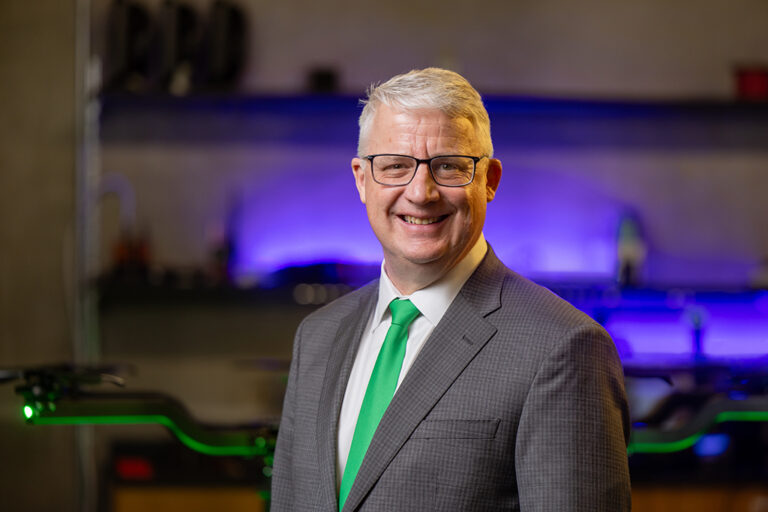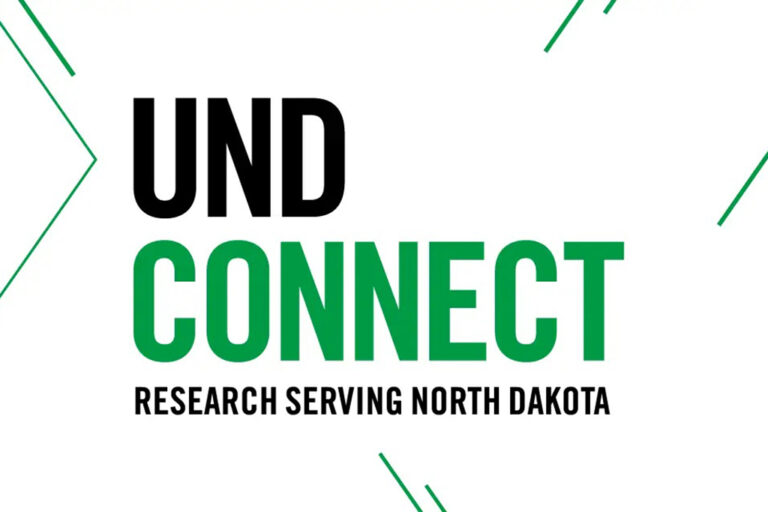Three minutes for complicated research
Students keep their research talks ‘short and sweet’ at annual Three Minute Thesis Competition

Three women. Three men. Three minutes.
No, this is not a speed dating event. Although the equal number of men and women was not deliberate, this was the setup of the final round of the Three Minute Thesis Competition at the University of North Dakota on Jan. 29.
In its fourth installment at UND, the contest requires participants – master’s and doctoral students – to succinctly relay their research endeavors in lay terms to an audience foreign to their field of study. No argot. No lab tools. No fancy graphics, other than a single, static PowerPoint slide.
Just three minutes – enough time to brush your teeth – filled with simple words.
Yet, it’s not as simple as it may seem.
“It sounds super easy, but in reality, it’s not easy to get it all in three minutes,” said Marie Bergelin, a Ph.D. student in geology who has taken part in the Three Minute Thesis Competition two years in a row. This year, she placed second overall.
“It’s really easy to present my research in 30 seconds because all I have to say is two sentences of the most basic, common things,” said Bergelin, whose research focuses on determining the age of glacial ice. “I can also do it in seven or eight minutes, because then I have time to actually go into some details about the method that I am using.
“But three minutes – I have to touch on everything, but I can’t get too deep, because I don’t have time for it. That’s hard, which is why it’s a competition, right?”
How it started
The Three Minute Thesis Competition first emerged at the University of Queensland in 2008, at a time when the Australian state was suffering through a severe draught. To conserve water, many residents relied on egg timers to curb their showers to three minutes. It’s a rather pedestrian constraint, but one that the then-dean of the university’s graduate school, Alan Lawson, molded into a challenge for budding academics.
From 160 participants at the inaugural Three Minute Thesis Competition (3MT) at the University of Queensland, these events akin to TED Talks-for-student-researchers now take place in over 600 universities in more than 85 countries. There are university-level competitions that usher winners to regional and national showdowns.
“The 3MT is really a problem-solving exercise for universities and communities to work,” said Chris Nelson, associate dean of UND’s Graduate School. “To do so, you need to be able to speak a common language. Participants need to be able to take complicated research and distill it into language that anyone can understand.”

Winner on stage
To condense her research to its fundamentals and then talk about them plainly, Mona Sohrabi Thompson, a doctoral candidate in biomedical sciences, crafted her presentation, rewrote it and changed it again.
“I couldn’t even talk about brain cell types, I couldn’t use their specific names,” said Sohrabi Thompson, who researches the links between Alzheimer’s disease and gut inflammation. “The only thing that I could work around was the toxic proteins” that accumulate in the brain as a result of Alzheimer’s disease.
So, Sohrabi Thompson tapped into her creativity. She figured out how to illustrate her theme with her single allowed visual: an image of a brain and a digestive system “chatting” on an old-fashioned corded phone.
After presenting twice (once in the morning preliminary round and once in the afternoon competition between six finalists), Sohrabi Thompson stood on stage, clutching an outsize check for the people’s choice award.
Then, Nelson, who emceed the competition, announced that the first-place winner was already on stage: Sohrabi Thompson. Initially, she did not grasp what that meant. “I couldn’t even imagine that the first place would go to me,” Sohrabi Thompson said.
Not the competitive type, Sohrabi Thompson was uncertain about participating in the 3MT when the chair of the biomedical sciences department nominated her (students need a recommendation from their graduate advisors to present their research). But now she is headed to a grander stage – the regional competition in New Mexico in early March.
“That will be a more stressful situation,” Sohrabi Thompson said, laughing.
Exciting but nerve-wracking
While the 14 competitors in this year’s 3MT likely had to steady their nerves before explaining their research to a panel of judges and an audience of several dozen people, Matt Gilmore, associate professor in atmospheric sciences, relished the contest last Wednesday.

Having attended a workshop in best practices in public science communication at the Alan Ada Center for Communicating Science at Stony Brook University in New York, Gilmore was the one to bring the 3MT Competition to UND. For four years, in the months leading up to the competition, he and a team of co-trainers also coached students how to efficiently and effectively talk about what they do.
The initial training sessions, Gilmore said, often unravel in stumbles and struggles to avoid jargon and remain succinct. The day of the competition usually reveals no such troubles.
“It’s really exciting to watch all of these students present their final 3MTs because I remember what they started with,” said Gilmore, who stepped down as 3MT head trainer last week. “I know the mountain that they climbed to get there.”
Faculty interested in helping as trainers next year may contact Chris Nelson at the Graduate School.


